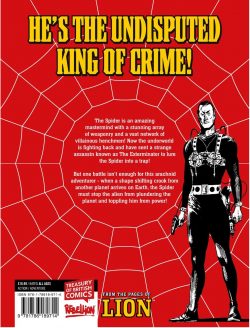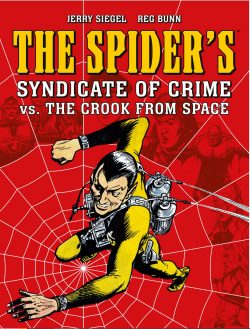

By Jerry Siegel & Reg Bunn (Rebellion)
ISBN: 978-1-78618-971-4 (HB/Digital edition)
Part of Rebellion’s Treasury of British Comics strand, The Spider’s Syndicate of Crime vs the Crook From Space is another sublimely cool collection celebrating an all-but forgotten sub-strand of the 1960s comics experience.
Until the 1980s, UK comics operated on an anthological model, offering variety of genre, theme and character on a weekly – or sometimes fortnightly – basis. Humorous periodicals like DC Thomson’s The Beano were leavened by thrillers like Billy the Cat or General Jumbo, and adventure papers like Amalgamated Press/Fleetway’s Lion or Valiant always carried gag strips such as The Nutts, Grimly Feendish, Mowser and a wealth of similar quick laugh treats.
British comics also notoriously enjoyed a strange, extended love affair with what can only be described as “unconventional” (for which feel free to substitute “creepy”) heroes. So many of our stars and potential role models of serials and strips were just plain “off”: self-righteous, moody voyeurs-turned vigilantes like Jason Hyde, sinister masterminds like The Dwarf, deranged geniuses like Eric Dolmann, jingoistic (and racist) supermen like Captain Hurricane and a plethora of reformed criminals/menaces like Charlie Peace, The Steel Claw or this guy…
… And don’t get me started on our legion of lethally anarchic comedy icons or that our most successful comic symbol of justice is an Eagle-bedecked, jack-booted poster boy for a fascist state. Perhaps that explains why these days we can’t even imagine or envision what a proper leader looks like and keep on electing clowns, crooks and blinkered over-privileged clueless simpletons…
All joking aside, British comics are unlike any other kind and simply must be seen to be believed and enjoyed. One of the most revered stars of the medium is being progressively collected in archival editions, perfectly encapsulating our odd relationship with heroism, villainy and in particular that murky grey area bridging them…
Mystery criminal genius and eventual superhero The Spider debuted in peerless weekly anthology Lion (June 26th 1965 issue), reigning supreme until April 26th 1969. He has periodically returned in reprint form (Vulcan) and occasionally new stories ever since.
As first introduced by Ted Cowan (Ginger Nutt, Paddy Payne, Adam Eterno, Robot Archie) & Reg Bunn (Robin Hood, Buck Jones, Captain Kid, Clip McCord), the moody malcontent was an enigmatic super-scientist whose goal was to be acclaimed the greatest criminal of all time.
The flamboyantly wicked narcissist began his public career by recruiting crime specialists – safecracker Roy Ordini and genteelly evil genius inventor Professor Pelham – before attempting a massive gem-theft from America’s greatest city. He was foiled by cruel luck and resolute cops Gilmore and Trask: crack detectives cursed with the task of capturing the arachnid arch-villain.
Cowan scripted the first two serialised sagas before handing over to comics royalty: Jerry Siegel (Superman, Superboy, The Spectre, Doctor Occult, Slam Bradley, Funnyman, The Mighty Crusaders, Starling), who was forced to look elsewhere for work after an infamous dispute with DC Comics over the rights to the Man of Steel.
This eagerly anticipated collection covers the Lion’s share of arachnid amazement from 25th June 1966 to 28th January 1967: two extended and interlocking epics crafted as Britain and the entire, but less fab & groovy world succumbed to “Batmania”.
In case you’re not old, that term covers a period of global hysteria sparked by the 1966 Batman TV show, which launched in January in the USA, with the UK catching the madness from 21st May until September 11th 1966. A second season ran here from September 17th to April 2nd 1967. The planet went crazy for superheroes and an era dubbed “camp” saw humour, satire, and fantastic psychedelic whimsy infect all categories of entertainment. It was a time of peace, love, wild music and radical change, and I believe there were lots of drugs being experimented with at the time…
British comics were not immune, and a host of more conventional costumed crusaders sprang up in our traditionally unconventional pages. Scripted by the godfather of the genre – and an inveterate humourist – The Spider skilfully shifted gears without a squeak and the first epic ‘The Spider v. The Exterminator’ saw the uncrowned king of crime preying upon and at war with the gathered mob lords of America, who called themselves Crime Incorporated.
The hooded leader – The Silhouette – had acted upon their behalf and hired a superpowered villain to destroy the wicked webspinner, but in numerous weekly clashes, only vividly spectacularly stalemates had been achieved. Eventually, after learning what the Silhouette really was, the foes became partners: resolved to impoverish and crush all other major criminals, and divide the planet between them. The crime lords struck back, leading to the return of old Spider enemies Dr. Mysterioso and The Android Emperor in extraordinary extended clashes until only two remained. Then abruptly, announcing there was more challenge and greater fun in fighting evil, The Spider declared himself a hero, ruthlessly betrayed the Exterminator and set out to be a world saver…
He got his chance the very next week whilst fighting devious and decrepit tech bandit The Infernal Gadgeteer, as their duels were interrupted by a marauding pillage from the stars.
‘The Spider versus the Crook From Outer Space’ played out for months, with manic combats and crazy inventions peppering a madcap competition that begins when the attention-seeking shapeshifter abducts the Gadgeteer so he/it can be centre of attention. Constantly attacking humanity in the guise of villains from history, the alien runs the Spider and his team ragged, upping the stakes with monsters and super-weapons whenever the make-believe hero frustrates him/it. The duel takes its emotional toll too, and when an alien invasion armada interrupts the games, the space crook petulantly but pitilessly destroys them for their temerity…
Despite breakneck pace, the story positively bulges with imaginative ingenuity, as when a hidden aquatic race from the oceans also foolishly disrupts the bout and pays the price, or when the sworn foes both change sides and trade moral perspectives…
As the end nears, Dr. Mysterioso returns leading a microscopic militia and sowing chaos but the coup de grace comes when the alien at last decides to battle his implacable antagonist as another, better Spider…
These retro/camp masterpieces of arcane dialogue, insane devices and rollercoaster antics are perhaps an acquired taste but no one with functioning eyes can fail to be astounded by the artwork of Reg “crosshatch king” Bunn which handles mood, spectacle, action and Siegel’s frankly unbelievable script demands with captivating aplomb.
This titanic tome reaffirms that the King is back at last and should find a home in every kid’s heart and mind, no matter how young they might be, or threaten to remain. Batty, baroque and often simply bonkers, The Spider proves that although crime does not pay, it always provides a huge amount of white-knuckle fun…
© 1996, 1967 & 2023 Rebellion Publishing IP Ltd. All Rights Reserved.
